
Offered by the College of Science – Department of Psychology
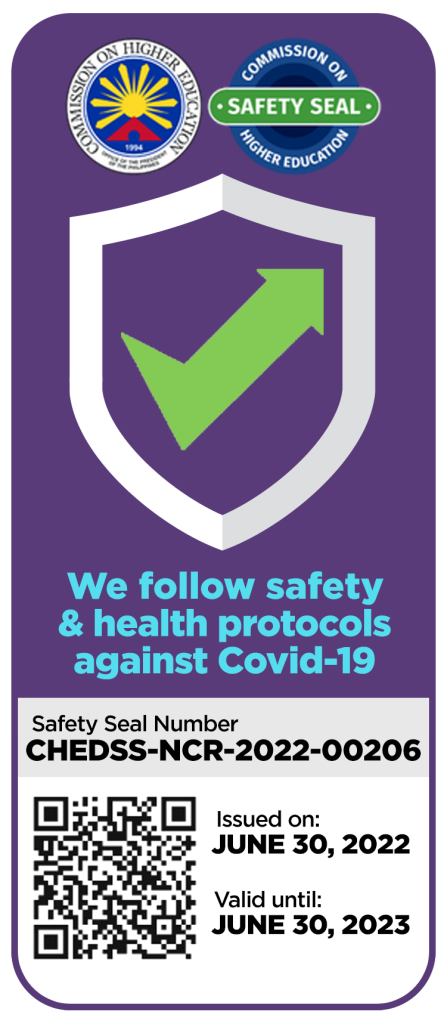
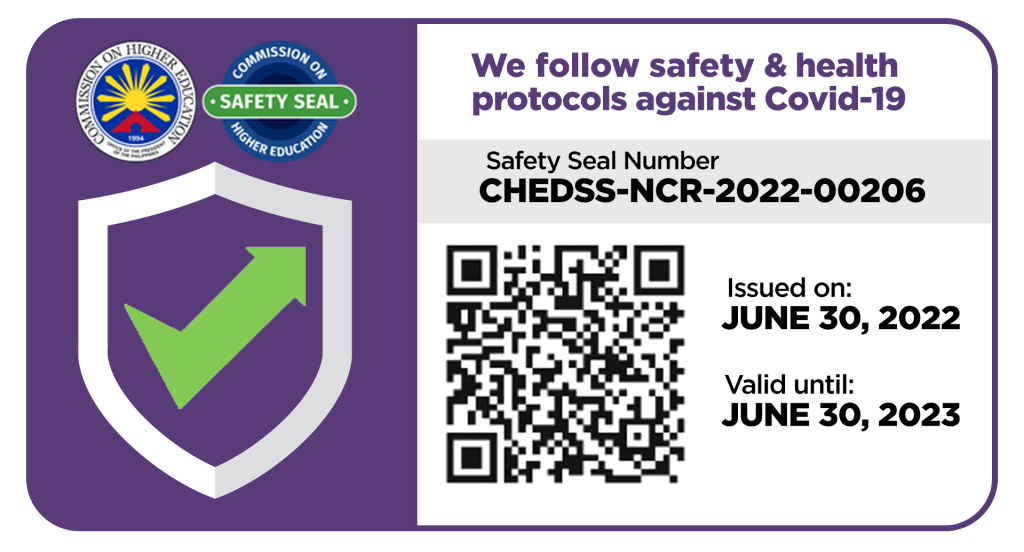




The Bachelor of Science in Psychology program is designed to provide students with a Biopsychosocial Model in the study human behavior. This holistic approach gives students the unique perspective of analyzing, interpreting, and exploring the dynamics of human behavior by utilizing concepts in the areas of biology (neuro-anatomy), psychology, and sociology. The Department of Psychology provides a progressive curriculum and research program that offer students the distinct, innovative, and dynamic opportunity to excel in the practice of psychology, particularly in industrial, educational, and clinical settings.
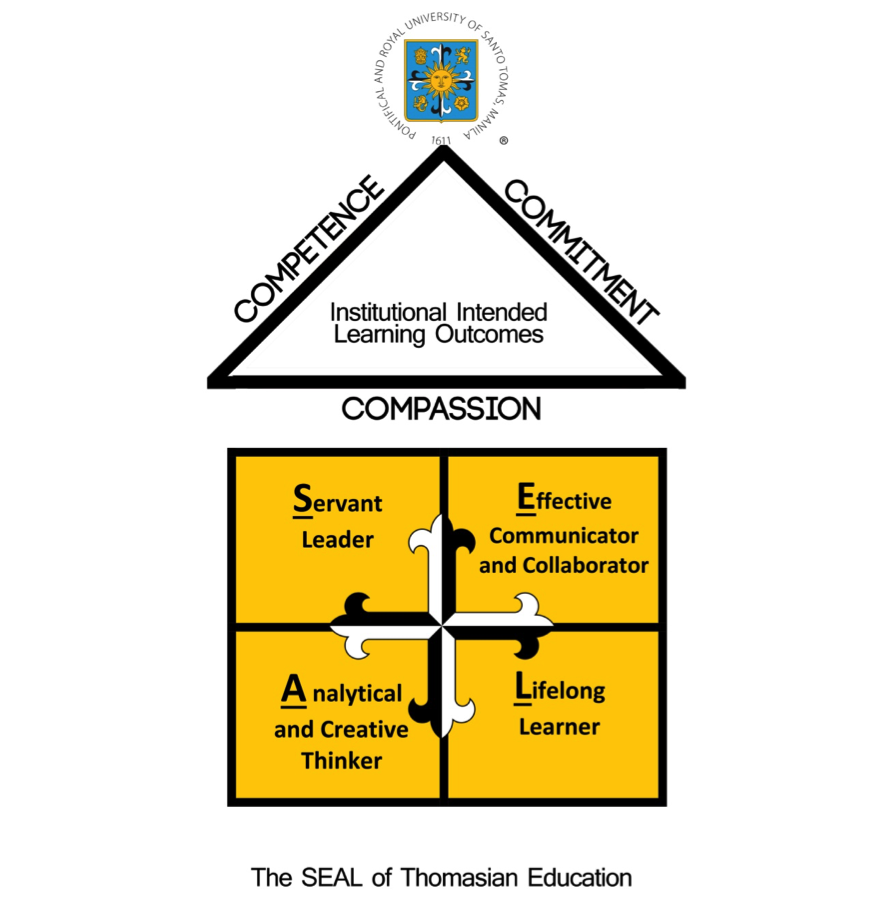
The University of Santo Tomas, in pursuit of truth, guided by reason and illumined by faith, dedicates herself to the generation, advancement, and transmission of knowledge to form competent and compassionate professionals committed to the service of the Church, the nation, and the global community.
I am a Thomasian. I carry the SEAL of Thomasian education. I am a Servant leader, an Effective communicator and collaborator, an Analytical and creative thinker, and a Lifelong learner. With Christ at the center of my formation as a Thomasian, I am expected to demonstrate the following Thomasian Graduate Attributes (ThoGAs):
SERVANT LEADER
EFFECTIVE COMMUNICATOR AND COLLABORATOR
ANALYTICAL AND CREATIVE THINKER
LIFELONG LEARNER
Graduate attributes are generic capabilities that ideally all graduates should possess by the end of their university learning experience, regardless of their field of specialization. These have been identified as being valued in a field of study, and are important considerations in the preparation of materials for learning and teaching.
A graduate of the College of Science is:
Application Period: July to December of each year
Release of Results: January 28 of the following year
Go to THIS PAGE and look for the “College of Science” tab for the tuition fees.
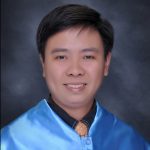
Dear Freshmen Thomasian Scientists,
I would like to extend my warmest virtual welcome to the UST College of Science to all of you!
Never in recent history has science played such a visible role in society. This highlights the country’s need for more scientists to continue the task of discovering and understanding the world we live in, and in innovating technologies and processes to solve humanity’s most pressing concerns. Thomasian scientists have always played a significant role in charting the scientific progress of this country. By choosing the UST College of Science, you have already shown a desire to be part of this country’s scientific workforce. Our motto in the College of Science is “Galing Science, Galing Science!”. This speaks of our desire to instill excellence among our students, which we hope you will all embody by the time you earn your degrees.
This is a truly unprecedented start to Academic Year 2020-2021 for all of us. Rest assured that the College of Science is one with the entire UST community in ensuring that learning will take place for our students despite these challenging circumstances. The learning management system of the university, dubbed the UST Cloud Campus, which has been in place for more than a decade now, is ready to provide the main platform for the efficient delivery of instruction. However, given the distinct challenges posed by the COVID-19 pandemic, our faculty are continuously innovating to meet the demands of this uncharted territory in higher education. We will also strive to provide adequate laboratory instruction, which is central to the sciences, despite the limitations set forth by physical distancing and public health regulations.
We hope to develop a strong partnership with you, our dear students, your parents, guardians, benefactors and families, in order to ensure that you get the quality Thomasian science education you sought to have by enrolling in our college.
We all pray that in due time, we can continue to deliver the quality Thomasian science education you deserve under more normal circumstances.
Prof. Rey Donne S. Papa, PhD
Dean
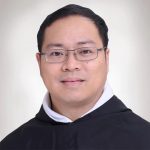
In this extraordinary time of the COVID-19 pandemic, the role of Faith and Science becomes greatly underscored in our life. Welcoming you to the University of Santo Tomás, therefore, does not only bring joy but hope for the people of God whom you will be serving.
In the face of physical, economic, psychological, and spiritual predicaments, we must be undeterred to pursue the Veritas (Truth) through our academic endeavors per scientiam ad Dominum (through Science towards the Lord) as inspired by our patron St. Albert the Great, and his illustrious disciple, St. Thomas Aquinas, who said: “Just as it is better to illuminate than merely to shine, so to pass on what one has contemplated is better than merely to contemplate” (cf. S.Th. II-II q. 188 a. 6.).
Through Faith and Science, we keep on finding courage in the midst of life’s hardship. When life is difficult, all the more that we need to be full of life. The harder the blow, the harder we hope. Illuminate others than merely shine. Share the fruits of your studies, than merely contemplate. Don’t be discouraged over closed doors; look for the back door and even the open windows. Don’t just focus on what we’ve lost; look also for what we’ve received. Welcome to the UST College of Science.
Rev. Fr. Louie R. Coronel, O.P., EHL
Regent
This program offers the following career options:
With further specialized training, graduates of this program may pursue specializations in Psychology such as clinical, counseling, developmental, educational, social, industrial/organizational, etc.
Graduates may also pursue careers in medicine, law, management, etc.
The University of Santo Tomas provides student services that cater to academic, spiritual, and wellness concerns of students. These support units are found in the different parts of the campus and can be accessed by Thomasians. When the University shifted to distance learning, the services also transitioned to online services to continue addressing the needs of Thomasians.
Effectivity: A.Y. 2023-2024
This curriculum may have some changes upon the availability of new guidelines.
Year | First Term (August – December) | Second Term (January – May) | Special Term (June – July) |
1 | / | / | none |
2 | / | / | none |
3 | / | / | / |
4 | / | / | none |
First Term
Abbreviation | Description | Lec. Hrs. | Lab. Hrs. | Units | Pre-Requisites |
MATH_MW | Mathematics in the Modern World | 3 | 0 | 3 | |
NSTP 1 | National Service Training Program 1 | 0 | 3 | 3 | |
PATH-FIT 1 | Physical Activities Towards Health and Fitness 1: | 2 | 0 | 2 | |
PSY 431 | Introduction to Psychology | 3 | 0 | 3 | |
PSY 432 | Neuro-Anatomy | 3 | 0 | 3 | |
PSY 433 | Developmental Psychology | 3 | 0 | 3 | |
PSY 434 | Theories of Learning | 3 | 0 | 3 | |
THY 1 | Christian Vision of the Human Person | 3 | 0 | 3 | |
TOTAL | 20 | 3 | 23 |
Second Term
Abbreviation | Description | Lec. Hrs. | Lab. Hrs. | Units | Pre-Requisites |
FIL | Panimulang Pagsasalin | 3 | 0 | 3 | |
NSTP 2 | National Service Training Program 2 | 0 | 0 | 3 | NSTP 1 |
PATH-FIT 2 | Physical Activities Towards Health and Fitness 2: | 2 | 0 | 2 | |
PSY 435 | Biopsychology | 3 | 0 | 3 | PSY 432 |
PSY 437 | Theories of Personality | 3 | 0 | 3 | PSY 434 |
PSY 438 | Educational Psychology | 3 | 0 | 3 | PSY 434 |
PURPCOM | Purposive Communication | 3 | 0 | 3 | |
THY 2 | Christian Vision of Marriage and Family | 3 | 0 | 3 | THY 1 |
UND_SELF | Understanding the Self | 3 | 0 | 3 | |
TOTAL | 23 | 3 | 26 |
First Term
Abbreviation | Description | Lec. Hrs. | Lab. Hrs. | Units | Pre-Requisites | Co-Requisites |
BIO 422 | General Zoology | 3 | 0 | 3 | ||
BIO 422L | General Zoology Laboratory | 0 | 2 | 2 | ||
ETHICS | Ethics | 3 | 0 | 3 | ||
PATH-FIT 3 | Physical Activities Towards Health and Fitness in | 2 | 0 | 2 | PATH-FIT 1, | |
PSY 436 | Psychological Statistics I | 3 | 0 | 3 | MATH_MW | |
PSY 439 | Social Psychology | 3 | 0 | 3 | PSY 434, PSY 437 | |
PSY 4310 | Psychological Assessment 1 Lecture | 3 | 0 | 3 | PSY 436, PSY 437 | |
PSY 4310L | Psychological Assessment 1 Laboratory | 0 | 2 | 2 | PSY 436, PSY 437 | |
THY 3 | Christian Vision of the Church in Society | 3 | 0 | 3 | THY 1, THY 2 | |
TOTAL | 20 | 4 | 24 |
Second Term
Abbreviation | Description | Lec. Hrs. | Lab. Hrs. | Units | Pre-Requisites | Co-Requisites |
PATH-FIT 4 | Physical Activities Towards Health and Fitness in Sports, | 2 | 0 | 2 | PATH-FIT 1, | |
PSY 4311 | Introduction to Human Physiology Lecture | 3 | 0 | 3 | PSY 435 | |
PSY 4311L | Introduction to Human Physiology Laboratory | 0 | 2 | 2 | PSY 435 | |
PSY 4312 | Group Dynamics | 3 | 0 | 3 | PSY 437, PSY 439 | |
PSY 4313 | Cognitive Psychology | 3 | 0 | 3 | PSY 437 | |
PSY 4314 | Industrial Psychology | 3 | 0 | 3 | PSY 4310 | |
PSY 4315 | Abnormal Psychology | 3 | 0 | 3 | PSY 435, PSY 437 | |
PSY 4316 | Psychological Statistics II Lecture | 3 | 0 | 3 | PSY 436 | |
PSY 4316L | Psychological Statistics II Laboratory | 0 | 1 | 1 | PSY 436 | |
THY 4 | Living the Christian Vision in the Contemporary World | 3 | 0 | 3 | THY 1, THY 2, THY 3 | |
TOTAL | 23 | 3 | 26 |
First Term
Abbreviation | Description | Lec. Hrs. | Lab. Hrs. | Units | Pre-Requisites | Co-Requisites |
ELE 1 | Professional Elective | 3 | 0 | 3 | ||
PSY 4317 | Bio-Organic Chemistry Lecture | 3 | 0 | 3 | ||
PSY 4317L | Bio-Organic Chemistry Laboratory | 0 | 2 | 2 | ||
PSY 4318 | Experimental Psychology Lecture | 3 | 0 | 3 | PSY 4310, PSY 4310L, PSY 4313, PSY 4316, | |
PSY 4318L | Experimental Psychology Laboratory | 0 | 2 | 2 | PSY 4310, | |
PSY 4319 | Field Methods Lecture | 3 | 0 | 3 | BIO, 422, BIO 422L, PSY 431, PSY 4310, PSY 4310L, PSY 4311, PSY 4311L, PSY 4312, PSY 4313, PSY 4314, PSY 4315, PSY 4316, PSY 4316L, PSY 432, PSY 433, PSY 434, PSY 435, PSY 436, PSY 437, PSY 438, PSY 439 | |
PSY 4319L | Field Methods Laboratory | 0 | 2 | 2 | BIO 422,
BIO 422L,
PSY 431,
PSY 4310,
PSY 4310L,
PSY 4311,
PSY 4311L,
PSY 4312,
PSY 4313,
PSY 4314,
PSY 4315,
PSY 4316,
PSY 4316L,
PSY 432,
PSY 433,
PSY 434,
PSY 435,
PSY 436,
PSY 437,
PSY 438,
PSY 439
| |
READ_PH | Readings in Philippine History | 3 | 0 | 3 | ||
STS | Science, Technology and Society | 3 | 0 | 3 | ||
TOTAL | 18 | 6 | 24 |
Second Term
Abbreviation | Description | Lec. Hrs. | Lab. Hrs. | Units | Pre-Requisites | Co-Requisites |
CONTEM_W | The Contemporary World | 3 | 0 | 3 | ||
ELE 2 | Professional Elective 2 | 3 | 0 | 3 | ||
PSY 4320 | General Physics Lecture | 4 | 0 | 4 | ||
PSY 4320L | General Physics Laboratory | 0 | 1 | 1 | ||
PSY 4321 | Psychological Assessment II (Introduction to Test Construction and Measurement) | 3 | 0 | 3 | PSY 4310, PSY 4310L | |
PSY 4322 | Clinical Psychology | 3 | 0 | 3 | PSY 4310, PSY 4310L, | |
PSY 4323 | Human Resource Management | 3 | 0 | 3 | PSY 4314 | |
SCI 403 | Research 1 | 2 | 0 | 2 | BIO 422, BIO 422L, PSY 431, PSY 4310, PSY 4310L, PSY 4311, PSY 4311L, PSY 4312, PSY 4313, PSY 4314, PSY 4315, PSY 4316, PSY 4316L, PSY 4317, PSY 4317L, PSY 4318, PSY 4318L, PSY 4319, PSY 4319L, PSY 432, PSY 433, PSY 434, PSY 435, PSY 436, PSY 437, PSY 438, PSY 439 | |
TOTAL | 21 | 1 | 22 |
Special Term
Abbreviation | Description | Lec. Hrs. | Lab. Hrs. | Units | Pre-Requisites | Co-Requisites |
PSY 4324 | Practicum A (Industrial and Clinical Settings) | 0 | 4 | 4 | BIO 422, BIO 422L, PSY 431, PSY 4310, PSY 4310L, PSY 4311, PSY 4311L, PSY 4312, PSY 4313, PSY 4314, PSY 4315, PSY 4316, PSY 4316L, PSY 4317, PSY 4318, PSY 4318L, PSY 4319, PSY 4319L, PSY 432, PSY 4320, PSY 4320L, PSY 4321, PSY 4322, PSY 4323, PSY 433, PSY 434, PSY 435, PSY 436, PSY 437, PSY 438, PSY 439, PURPCOM, READ_PH, SCI 403 | |
TOTAL | 0 | 4 | 4 |
First Term
Abbreviation | Description | Lec. Hrs. | Lab. Hrs. | Units | Pre-Requisites |
ART_APP | Art Appreciation | 3 | 0 | 3 | |
GE ELEC I | Elective I | 3 | 0 | 3 | |
PSY 4325 | Training and Development | 3 | 0 | 3 | PSY 4312, PSY 4323 |
PSY 4326 | Practicum B (Educational) | 0 | 2 | 2 | BIO 422, BIO 422L PSY 431, PSY 4310, PSY 4310L, PSY 4311, PSY 4311L, PSY 4312, PSY 4313, PSY 4314, PSY 4315, PSY 4316, PSY 4316L, PSY 4317, PSY 4318, PSY 4319, PSY 432, PSY 4320, PSY 4320L, PSY 4321, PSY 4322, PSY 4323, PSY 4324, PSY 433, PSY 434, PSY 435, PSY 436, PSY 437, PSY 438, PSY 439 |
PSY 4327 | Culture and Psychology | 3 | 0 | 3 | PSY 4319, PSY 4319L, |
SCI 405 | Research 2 | 0 | 2 | 2 | SCI 403 |
TOTAL | 12 | 4 | 16 |
Second Term
Abbreviation | Description | Lec. Hrs. | Lab. Hrs. | Units | Pre-Requisites |
GE ELEC II | Elective II | 3 | 0 | 3 | |
GE ELEC III | Elective III | 3 | 0 | 3 | |
LIWORIZ | Life and Works of Rizal | 3 | 0 | 3 | |
PSY 4328 | Ethics in Psychology | 3 | 0 | 3 | BIO 422, BIO 422L, PSY 431, PSY 4310L, PSY 4311, PSY 4311L, PSY 4312, PSY 4313, PSY 4314, PSY 4315, PSY 4316, PSY 4316L, PSY 4317, PSY 4317L, PSY 4318, PSY 4318L, PSY 4319, PSY 4319L, PSY 432, PSY 4320, PSY 4320L, PSY 4321, PSY 4322, PSY 4323, PSY 4324, PSY 4325, PSY 4326, PSY 4327, PSY 433, PSY 434, PSY 435, PSY 436, PSY 437, PSY 438, PSY 439 |
PSY 4329 | Correlation Course in Psychology | 0 | 2 | 2 | BIO 422,
BIO 422L,
PSY 431,
PSY 4310,
PSY 4310L,
PSY 4311,
PSY 4311L,
PSY 4312,
PSY 4313,
PSY 4314,
PSY 4315,
PSY 4316,
PSY 4316L,
PSY 4317,
PSY 4317L,
PSY 4318,
PSY 4318L,
PSY 4319,
PSY 4319L,
PSY 432,
PSY 4320,
PSY 4320L,
PSY 4321,
PSY 4322,
PSY 4323,
PSY 4324,
PSY 4325,
PSY 4326,
PSY 4327,
PSY 433,
PSY 434,
PSY 435,
PSY 436,
PSY 437,
PSY 438,
PSY 439 |
SCI 406 | Research 3 | 0 | 2 | 2 | SCI 405 |
TOTAL | 12 | 4 | 16 |
Effectivity: A.Y. 2021-2022
This curriculum may have some changes upon the availability of new guidelines.
Year | First Term (August – December) | Second Term (January – May) | Special Term (June – July) |
1 | / | / | none |
2 | / | / | none |
3 | / | / | / |
4 | / | / | none |
First Term
Abbreviation | Description | Lec. Hrs. | Lab. Hrs. | Units | Pre-Requisites |
MATH_MW | Mathematics in the Modern World | 3 | 0 | 3 | |
NSTP 1 | National Service Training Program 1 | 0 | 3 | 3 | |
PATH-FIT | Physical Activities Towards Health and Fitness in Sports | 2 | 0 | 2 | |
PSY 431 | Introduction to Psychology | 3 | 0 | 3 | |
PSY 432 | Neuro-Anatomy | 3 | 0 | 3 | |
PSY 433 | Developmental Psychology | 3 | 0 | 3 | |
PSY 434 | Theories of Learning | 3 | 0 | 3 | |
THY 1 | Christian Vision of the Human Person | 3 | 0 | 3 | |
TOTAL | 20 | 3 | 23 |
Second Term
Abbreviation | Description | Lec. Hrs. | Lab. Hrs. | Units | Pre-Requisites |
FIL | Panimulang Pagsasalin | 3 | 0 | 3 | |
NSTP 2 | National Service Training Program 2 | 0 | 0 | 3 | NSTP 1 |
PATH-FIT | Physical Activities Towards Health and Fitness in Dance | 2 | 0 | 2 | |
PSY 435 | Biopsychology | 3 | 0 | 3 | PSY 432 |
PSY 437 | Theories of Personality | 3 | 0 | 3 | PSY 434 |
PSY 438 | Educational Psychology | 3 | 0 | 3 | PSY 434 |
PURPCOM | Purposive Communication | 3 | 0 | 3 | |
THY 2 | Christian Vision of Marriage and Family | 3 | 0 | 3 | THY 1 |
UND_SELF | Understanding the Self | 3 | 0 | 3 | |
TOTAL | 23 | 3 | 26 |
First Term
Abbreviation | Description | Lec. Hrs. | Lab. Hrs. | Units | Pre-Requisites | Co-Requisites |
BIO 422 | General Zoology | 3 | 0 | 3 | BIO 422L | |
BIO 422L | General Zoology Laboratory | 0 | 2 | 2 | BIO 422 | |
ETHICS | Ethics | 3 | 0 | 3 | ||
PATH-FIT | Fitness Excercises for Specific Sports | 2 | 0 | 2 | ||
PSY 436 | Psychological Statistics I | 3 | 0 | 3 | MATH_MW | |
PSY 439 | Social Psychology | 3 | 0 | 3 | PSY 434, PSY 437 | |
PSY 4310 | Psychological Assessment 1 Lecture | 3 | 0 | 3 | PSY 436, PSY 437 | PSY 4310L |
PSY 4310L | Psychological Assessment 1 Laboratory | 0 | 2 | 2 | PSY 436, PSY 437 | PSY 4310 |
THY 3 | Christian Vision of the Church in Society | 3 | 0 | 3 | THY 1, THY 2 | |
TOTAL | 20 | 4 | 24 |
Second Term
Abbreviation | Description | Lec. Hrs. | Lab. Hrs. | Units | Pre-Requisites | Co-Requisites |
PATH-FIT | Human Enhancement | 2 | 0 | 2 | ||
PSY 4311 | Introduction to Human Physiology Lecture | 3 | 0 | 3 | PSY 435 | PSY 4311L |
PSY 4311L | Introduction to Human Physiology Laboratory | 0 | 2 | 2 | PSY 435 | PSY 4311 |
PSY 4312 | Group Dynamics | 3 | 0 | 3 | PSY 437, PSY 439 | |
PSY 4313 | Cognitive Psychology | 3 | 0 | 3 | PSY 437 | |
PSY 4314 | Industrial Psychology | 3 | 0 | 3 | PSY 4310 | |
PSY 4315 | Abnormal Psychology | 3 | 0 | 3 | PSY 435, PSY 437 | |
PSY 4316 | Psychological Statistics II Lecture | 3 | 0 | 3 | PSY 436 | PSY 4316L |
PSY 4316L | Psychological Statistics II Laboratory | 0 | 1 | 1 | PSY 436 | PSY 4316 |
THY 4 | Living the Christian Vision in the Contemporary World | 3 | 0 | 3 | THY 1, THY 2, THY 3 | |
TOTAL | 23 | 3 | 26 |
First Term
Abbreviation | Description | Lec. Hrs. | Lab. Hrs. | Units | Pre-Requisites | Co-Requisites |
ELE 1 | Professional Elective | 3 | 0 | 3 | ||
PSY 4317 | Bio-Organic Chemistry Lecture | 3 | 0 | 3 | PSY 4317L | |
PSY 4317L | Bio-Organic Chemistry Laboratory | 0 | 2 | 2 | PSY 4317 | |
PSY 4318 | Experimental Psychology Lecture | 3 | 0 | 3 | PSY 4310, PSY 4310L, PSY 4313, PSY 4316 | PSY 4318L |
PSY 4318L | Experimental Psychology Laboratory | 0 | 2 | 2 | PSY 4310, PSY 4310L, PSY 4313, PSY 4316 | PSY 4318 |
PSY 4319 | Field Methods Lecture | 3 | 0 | 3 | BIO, 422, BIO 422L, ETHICS, MATH_MW, PSY 431, PSY 4310, PSY 4310L, PSY 4311, PSY 4311L, PSY 4312, PSY 4313, PSY 4314, PSY 4315, PSY 4316, PSY 4316L, PSY 432, PSY 433, PSY 434, PSY 435, PSY 436, PSY 437, PSY 438, PSY 439, PURPCOM, THY 3, THY 4, UND_SELF | PSY 4319L |
PSY 4319L | Field Methods Laboratory | 0 | 2 | 2 | BIO,
422,
BIO 422L,
ETHICS,
MATH_MW,
PSY 431,
PSY 4310,
PSY 4310L,
PSY 4311,
PSY 4311L,
PSY 4312,
PSY 4313,
PSY 4314,
PSY 4315,
PSY 4316,
PSY 4316L,
PSY 432,
PSY 433,
PSY 434,
PSY 435,
PSY 436,
PSY 437,
PSY 438,
PSY 439,
PURPCOM,
THY 3,
THY 4,
UND_SELF
| PSY 4319 |
READ_PH | Readings in Philippine History | 3 | 0 | 3 | ||
STS | Science, Technology and Society | 3 | 0 | 3 | ||
TOTAL | 18 | 6 | 24 |
Second Term
Abbreviation | Description | Lec. Hrs. | Lab. Hrs. | Units | Pre-Requisites | Co-Requisites |
CONTEM_W | The Contemporary World | 3 | 0 | 3 | ||
ELE 2 | Professional Elective 2 | 3 | 0 | 3 | ||
PSY 4320 | General Physics Lecture | 4 | 0 | 4 | PSY 4320L | |
PSY 4320L | General Physics Laboratory | 0 | 1 | 1 | PSY 4320 | |
PSY 4321 | Psychological Assessment II (Introduction to Test Construction and Measurement) | 3 | 0 | 3 | PSY 4310, PSY 4310L | |
PSY 4322 | Clinical Psychology | 3 | 0 | 3 | PSY 4310, PSY 4310L | |
PSY 4323 | Human Resource Management | 3 | 0 | 3 | PSY 4314 | |
SCI 403 | Research 1 | 2 | 0 | 2 | BIO 422, BIO 422L, ETHICS, MATH_MW, NSTP 1, NSTP 2, PSY 431, PSY 4310, PSY 4310L, PSY 4311, PSY 4311L, PSY 4312, PSY 4313, PSY 4314, PSY 4315, PSY 4316, PSY 4316L, PSY 4317, PSY 4317L, PSY 4318, PSY 4318L, PSY 4319, PSY 4319L, PSY 432, PSY 433, PSY 434, PSY 435, PSY 436, PSY 437, PSY 438, PSY 439, PURPCOM, THY 1, THY 2, THY 3, THY 4, UND_SELF | |
TOTAL | 21 | 1 | 22 |
Special Term
Abbreviation | Description | Lec. Hrs. | Lab. Hrs. | Units | Pre-Requisites | Co-Requisites |
PSY 4324 | Practicum A (Industrial and Clinical Settings) | 0 | 4 | 4 | BIO 422, BIO 422L, CONTEM_W, MATH_MW, PSY 431, PSY 4310, PSY 4310L, PSY 4311, PSY 4311L, PSY 4312, PSY 4313, PSY 4314, PSY 4315, PSY 4316, PSY 4316L, PSY 4317, PSY 4318, PSY 4318L, PSY 4319, PSY 4319L, PSY 432, PSY 4320, PSY 4320L, PSY 4321, PSY 4322, PSY 4323, PSY 433, PSY 434, PSY 435, PSY 436, PSY 437, PSY 438, PSY 439, PURPCOM, READ_PH, SCI 403, STS, THY 1, THY 2, THY 3, THY 4, UND_SELF | |
TOTAL | 0 | 4 | 4 |
First Term
Abbreviation | Description | Lec. Hrs. | Lab. Hrs. | Units | Pre-Requisites |
ART_APP | Art Appreciation | 3 | 0 | 3 | |
GE ELEC I | Elective I | 3 | 0 | 3 | |
PSY 4325 | Training and Development | 3 | 0 | 3 | PSY 4312, PSY 4323 |
PSY 4326 | Practicum B (Educational) | 0 | 2 | 2 | BIO 422, BIO 422L, CONTEM_W, ETHICS, MATH_MW, NSTP 1, NSTP 2, PSY 431, PSY 4310, PSY 4310L, PSY 4311, PSY 4311L, PSY 4312, PSY 4313, PSY 4314, PSY 4315, PSY 4316, PSY 4316L, PSY 4317, PSY 4318, PSY 4319, PSY 432, PSY 4320, PSY 4320L, PSY 4321, PSY 4322, PSY 4323, PSY 4324, PSY 433, PSY 434, PSY 435, PSY 436, PSY 437, PSY 438, PSY 439, PURPCOM, READ_PH, STS, THY 1, THY 2, THY 3, THY 4, UND_SELF |
PSY 4327 | Culture and Psychology | 3 | 0 | 3 | PSY 4319, PSY 4319L |
SCI 405 | Research 2 | 0 | 2 | 2 | SCI 403 |
TOTAL | 12 | 4 | 16 |
Second Term
Abbreviation | Description | Lec. Hrs. | Lab. Hrs. | Units | Pre-Requisites |
GE ELEC II | Elective II | 3 | 0 | 3 | |
GE ELEC III | Elective III | 3 | 0 | 3 | |
LIWORIZ | Life and Works of Rizal | 3 | 0 | 3 | |
PSY 4328 | Ethics in Psychology | 3 | 0 | 3 | ART_APP, BIO 422, BIO 422L, CONTEM_W, ETHICS, MATH_MW, NSTP 1, NSTP 2, PSY 431, PSY 4310L, PSY 4311, PSY 4311L, PSY 4312, PSY 4313, PSY 4314, PSY 4315, PSY 4316, PSY 4316L, PSY 4317, PSY 4317L, PSY 4318, PSY 4318L, PSY 4319, PSY 4319L, PSY 432, PSY 4320, PSY 4320L, PSY 4321, PSY 4322, PSY 4323, PSY 4324, PSY 4325, PSY 4326, PSY 4327, PSY 433, PSY 434, PSY 435, PSY 436, PSY 437, PSY 438, PSY 439, PURPCOM, READ_PH, SCI 403, THY 1, THY 2, THY 3, THY 4, UND_SELF |
PSY 4329 | Correlation Course in Psychology | 0 | 2 | 2 | BIO 422,
BIO 422L,
CONTEM_W,
ETHICS,
MATH_MW,
NSTP 1,
NSTP 2,
PSY 431,
PSY 4310,
PSY 4310L,
PSY 4311,
PSY 4311L,
PSY 4312,
PSY 4313,
PSY 4314,
PSY 4315,
PSY 4316,
PSY 4316L,
PSY 4317,
PSY 4317L,
PSY 4318,
PSY 4318L,
PSY 4319,
PSY 4319L,
PSY 432,
PSY 4320,
PSY 4320L,
PSY 4321,
PSY 4322,
PSY 4323,
PSY 4324,
PSY 4325,
PSY 4326,
PSY 4327,
PSY 433,
PSY 434,
PSY 435,
PSY 436,
PSY 437,
PSY 438,
PSY 439,
PURPCOM,
READ_PH,
STS,
THY 1,
THY 2,
THY 3,
THY 4,
UND_SELF |
SCI 406 | Research 3 | 0 | 2 | 2 | SCI 405 |
TOTAL | 12 | 4 | 16 |
Effectivity: A.Y. 2019-2020
This curriculum may have some changes upon the availability of new guidelines.
Year | First Term (August – December) | Second Term (January – May) | Special Term (June – July) |
1 | / | / | none |
2 | / | / | none |
3 | / | / | / |
4 | / | / | none |
First Term
Abbreviation | Description | Lec. Hrs. | Lab. Hrs. | Units | Pre-Requisites |
FIL 1 | Kontekstwalisadong Komunikasyon sa Filipino | 3 | 0 | 3 | |
MATH_MW | Mathematics in the Modern World | 3 | 0 | 3 | |
NSTP 1 | National Service Training Program 1 | 0 | 3 | 3 | |
PATH-FIT | Physical Activities Towards Health and Fitness in Sports | 2 | 0 | 2 | |
PSY 431 | Introduction to Psychology | 3 | 0 | 3 | |
PSY 432 | Neuro-Anatomy | 3 | 0 | 3 | |
PSY 433 | Developmental Psychology | 3 | 0 | 3 | |
PSY 434 | Theories of Learning | 3 | 0 | 3 | |
THY 1 | Christian Vision of the Human Person | 3 | 0 | 3 | |
TOTAL | 23 | 3 | 26 |
Second Term
Abbreviation | Description | Lec. Hrs. | Lab. Hrs. | Units | Pre-Requisites |
FIL 2 | Panimulang Pagsasalin | 3 | 0 | 3 | FIL 1 |
NSTP 2 | National Service Training Program 2 | 0 | 0 | 3 | NSTP 1 |
PATH-FIT | Physical Activities Towards Health and Fitness in Dance | 2 | 0 | 2 | |
PSY 435 | Biopsychology | 3 | 0 | 3 | PSY 432 |
PSY 436 | Psychological Statistics I | 3 | 0 | 3 | MATH_MW |
PSY 437 | Theories of Personality | 3 | 0 | 3 | PSY 434 |
PURPCOM | Purposive Communication | 3 | 0 | 3 | |
THY 2 | Christian Vision of Marriage and Family | 3 | 0 | 3 | THY 1 |
UND_SELF | Understanding the Self | 3 | 0 | 3 | |
TOTAL | 23 | 3 | 26 |
First Term
Abbreviation | Description | Lec. Hrs. | Lab. Hrs. | Units | Pre-Requisites | Co-Requisites |
ETHICS | Ethics | 3 | 0 | 3 | ||
PATH-FIT | Fitness Excercises for Specific Sports | 2 | 0 | 2 | ||
PSY 438 | Educational Psychology | 3 | 0 | 3 | PSY 434 | |
PSY 439 | Social Psychology | 3 | 0 | 3 | PSY 434, PSY 437 | |
PSY 4310 | Psychological Assessment 1 Lecture | 3 | 0 | 3 | PSY 436, PSY 437 | |
PSY 4310L | Psychological Assessment 1 Laboratory | 0 | 2 | 2 | PSY 436, PSY 437 | PSY 4310 |
PSY 4311 | Introduction to Human Physiology Lecture | 3 | 0 | 3 | PSY 435 | |
PSY 4311L | Introduction to Human Physiology Laboratory | 0 | 2 | 2 | PSY 435 | PSY 4311 |
THY 3 | Christian Vision of the Church in Society | 3 | 0 | 3 | THY 1, THY 2 | |
TOTAL | 20 | 4 | 24 |
Second Term
Abbreviation | Description | Lec. Hrs. | Lab. Hrs. | Units | Pre-Requisites | Co-Requisites |
BIO 422 | General Zoology | 3 | 0 | 3 | ||
BIO 422L | General Zoology Laboratory | 0 | 2 | 2 | ||
PATH-FIT | Human Enhancement | 2 | 0 | 2 | ||
PSY 4312 | Group Dynamics | 3 | 0 | 3 | PSY 437, PSY 439 | |
PSY 4313 | Cognitive Psychology | 3 | 0 | 3 | PSY 437 | |
PSY 4314 | Industrial Psychology | 3 | 0 | 3 | PSY 4310 | |
PSY 4315 | Abnormal Psychology | 3 | 0 | 3 | PSY 435, PSY 437 | |
PSY 4316 | Psychological Statistics II Lecture | 3 | 0 | 3 | PSY 436 | |
PSY 4316L | Psychological Statistics II Laboratory | 0 | 1 | 1 | PSY 436 | PSY 4316 |
THY 4 | Living the Christian Vision in the Contemporary World | 3 | 0 | 3 | THY 1, THY 2, THY 3 | |
TOTAL | 23 | 3 | 26 |
First Term
Abbreviation | Description | Lec. Hrs. | Lab. Hrs. | Units | Pre-Requisites | Co-Requisites |
ELE 1 | Professional Elective | 3 | 0 | 3 | ||
PSY 4317 | Bio-Organic Chemistry Lecture | 3 | 0 | 3 | ||
PSY 4317L | Bio-Organic Chemistry Laboratory | 0 | 2 | 2 | PSY 4317 | |
PSY 4318 | Experimental Psychology Lecture | 3 | 0 | 3 | PSY 4310, PSY 4310L, PSY 4313, PSY 4316 | |
PSY 4318L | Experimental Psychology Laboratory | 0 | 2 | 2 | PSY 4310, PSY 4310L, PSY 4313, PSY 4316 | PSY 4318 |
PSY 4319 | Field Methods Lecture | 3 | 0 | 3 | BIO, 422, BIO 422L, ETHICS, FIL 1, FIL 2, MATH_MW, PE 3, PE 4, PSY 431, PSY 4310, PSY 4310L, PSY 4311, PSY 4311L, PSY 4312, PSY 4313, PSY 4314, PSY 4315, PSY 4316, PSY 4316L, PSY 432, PSY 433, PSY 434, PSY 435, PSY 436, PSY 437, PSY 438, PSY 439, PURPCOM, THY 3, THY 4, UND_SELF | |
PSY 4319L | Field Methods Laboratory | 0 | 2 | 2 | BIO,
422,
BIO 422L,
ETHICS,
FIL 1,
FIL 2,
MATH_MW,
PE 3,
PE 4,
PSY 431,
PSY 4310,
PSY 4310L,
PSY 4311,
PSY 4311L,
PSY 4312,
PSY 4313,
PSY 4314,
PSY 4315,
PSY 4316,
PSY 4316L,
PSY 432,
PSY 433,
PSY 434,
PSY 435,
PSY 436,
PSY 437,
PSY 438,
PSY 439,
PURPCOM,
THY 3,
THY 4,
UND_SELF
| PSY 4319 |
READ_PH | Readings in Philippine History | 3 | 0 | 3 | ||
STS | Science, Technology and Society | 3 | 0 | 3 | ||
TOTAL | 18 | 6 | 24 |
Second Term
Abbreviation | Description | Lec. Hrs. | Lab. Hrs. | Units | Pre-Requisites | Co-Requisites |
CONTEM_W | The Contemporary World | 3 | 0 | 3 | ||
ELE 2 | Professional Elective 2 | 3 | 0 | 3 | ||
PSY 4320 | General Physics Lecture | 4 | 0 | 4 | PSY 4320L | |
PSY 4320L | General Physics Laboratory | 0 | 1 | 1 | PSY 4320 | |
PSY 4321 | Psychological Assessment II (Introduction to Test Construction and Measurement) | 3 | 0 | 3 | PSY 4310, PSY 4310L | |
PSY 4322 | Clinical Psychology | 3 | 0 | 3 | PSY 4310, PSY 4310L | |
PSY 4323 | Human Resource Management | 3 | 0 | 3 | PSY 4314 | |
SCI 403 | Research 1 | 2 | 0 | 2 | BIO 422, BIO 422L, ETHICS, FIL 1, FIL 2, MATH_MW, NSTP 1, NSTP 2, PE 1, PE 2, PE 3, PE 4, PSY 431, PSY 4310, PSY 4310L, PSY 4311, PSY 4311L, PSY 4312, PSY 4313, PSY 4314, PSY 4315, PSY 4316, PSY 4316L, PSY 4317, PSY 4317L, PSY 4318, PSY 4318L, PSY 4319, PSY 4319L, PSY 432, PSY 433, PSY 434, PSY 435, PSY 436, PSY 437, PSY 438, PSY 439, PURPCOM, THY 1, THY 2, THY 3, THY 4, UND_SELF | |
TOTAL | 21 | 1 | 22 |
Special Term
Abbreviation | Description | Lec. Hrs. | Lab. Hrs. | Units | Pre-Requisites | Co-Requisites |
PSY 4324 | Practicum A (Industrial and Clinical Settings) | 0 | 4 | 4 | BIO 422, BIO 422L, CONTEM_W, FIL 1, FIL 2, MATH_MW, PE 1, PE 2, PE 3, PE 4, PSY 431, PSY 4310, PSY 4310L, PSY 4311, PSY 4311L, PSY 4312, PSY 4313, PSY 4314, PSY 4315, PSY 4316, PSY 4316L, PSY 4317, PSY 4318, PSY 4318L, PSY 4319, PSY 4319L, PSY 432, PSY 4320, PSY 4320L, PSY 4321, PSY 4322, PSY 4323, PSY 433, PSY 434, PSY 435, PSY 436, PSY 437, PSY 438, PSY 439, PURPCOM, READ_PH, SCI 403, STS, THY 1, THY 2, THY 3, THY 4, UND_SELF | |
TOTAL | 0 | 4 | 4 |
First Term
Abbreviation | Description | Lec. Hrs. | Lab. Hrs. | Units | Pre-Requisites |
ART_APP | Art Appreciation | 3 | 0 | 3 | |
GE ELEC I | Elective I | 3 | 0 | 3 | |
LIT 1 | The Great Works | 3 | 0 | 3 | |
PSY 4325 | Training and Development | 3 | 0 | 3 | PSY 4312, PSY 4323 |
PSY 4326 | Practicum B (Educational) | 0 | 2 | 2 | BIO 422, BIO 422L, CONTEM_W, ETHICS, FIL 1, FIL 2, MATH_MW, NSTP 1, NSTP 2, PE 1, PE 2, PE 3, PE 4, PSY 431, PSY 4310, PSY 4310L, PSY 4311, PSY 4311L, PSY 4312, PSY 4313, PSY 4314, PSY 4315, PSY 4316, PSY 4316L, PSY 4317, PSY 4318, PSY 4319, PSY 432, PSY 4320, PSY 4320L, PSY 4321, PSY 4322, PSY 4323, PSY 4324, PSY 433, PSY 434, PSY 435, PSY 436, PSY 437, PSY 438, PSY 439, PURPCOM, READ_PH, STS, THY 1, THY 2, THY 3, THY 4, UND_SELF |
PSY 4327 | Culture and Psychology | 3 | 0 | 3 | PSY 4319, PSY 4319L |
SCI 405 | Research 2 | 0 | 2 | 2 | SCI 403 |
TOTAL | 15 | 4 | 19 |
Second Term
Abbreviation | Description | Lec. Hrs. | Lab. Hrs. | Units | Pre-Requisites |
GE ELEC II | Elective II | 3 | 0 | 3 | |
GE ELEC III | Elective III | 3 | 0 | 3 | |
LIWORIZ | Life and Works of Rizal | 3 | 0 | 3 | |
PSY 4328 | Ethics in Psychology | 3 | 0 | 3 | ART_APP, BIO 422, BIO 422L, CONTEM_W, ETHICS, FIL 1, FIL 2, LIT 1, MATH_MW, NSTP 1, NSTP 2, PE 1, PE 2, PE 3, PE 4, PSY 431, PSY 4310L, PSY 4311, PSY 4311L, PSY 4312, PSY 4313, PSY 4314, PSY 4315, PSY 4316, PSY 4316L, PSY 4317, PSY 4317L, PSY 4318, PSY 4318L, PSY 4319, PSY 4319L, PSY 432, PSY 4320, PSY 4320L, PSY 4321, PSY 4322, PSY 4323, PSY 4324, PSY 4325, PSY 4326, PSY 4327, PSY 433, PSY 434, PSY 435, PSY 436, PSY 437, PSY 438, PSY 439, PURPCOM, READ_PH, SCI 403, THY 1, THY 2, THY 3, THY 4, UND_SELF |
PSY 4329 | Correlation Course in Psychology | 0 | 2 | 2 | BIO 422,
BIO 422L,
CONTEM_W,
ETHICS,
FIL 1,
FIL 2,
LIT 1,
MATH_MW,
NSTP 1,
NSTP 2,
PE 1,
PE 2,
PE 3,
PE 4,
PSY 431,
PSY 4310,
PSY 4310L,
PSY 4311,
PSY 4311L,
PSY 4312,
PSY 4313,
PSY 4314,
PSY 4315,
PSY 4316,
PSY 4316L,
PSY 4317,
PSY 4317L,
PSY 4318,
PSY 4318L,
PSY 4319,
PSY 4319L,
PSY 432,
PSY 4320,
PSY 4320L,
PSY 4321,
PSY 4322,
PSY 4323,
PSY 4324,
PSY 4325,
PSY 4326,
PSY 4327,
PSY 433,
PSY 434,
PSY 435,
PSY 436,
PSY 437,
PSY 438,
PSY 439,
PURPCOM,
READ_PH,
STS,
THY 1,
THY 2,
THY 3,
THY 4,
UND_SELF |
SCI 406 | Research 3 | 0 | 2 | 2 | SCI 405 |
TOTAL | 12 | 4 | 16 |
Effectivity: A.Y. 2018-2019
This curriculum may have some changes upon the availability of new guidelines.
Year | First Term (August – December) | Second Term (January – May) | Special Term (June – July) |
1 | / | / | none |
2 | / | / | none |
3 | / | / | / |
4 | / | / | none |
First Term
Abbreviation | Description | Lec. Hrs. | Lab. Hrs. | Units | Pre-Requisites |
FIL 1 | Kontekstwalisadong Komunikasyon sa Filipino | 3 | 0 | 3 | |
MATH_MW | Mathematics in the Modern World | 3 | 0 | 3 | |
NSTP 1 | National Service Training Program 1 | 0 | 3 | 3 | |
PATH-FIT | Physical Activities Towards Health and Fitness in Sports | 2 | 0 | 2 | |
PSY 431 | Introduction to Psychology | 3 | 0 | 3 | |
PSY 432 | Neuro-Anatomy | 3 | 0 | 3 | |
PSY 433 | Developmental Psychology | 3 | 0 | 3 | |
PSY 434 | Theories of Learning | 3 | 0 | 3 | |
THY 1 | Christian Vision of the Human Person | 3 | 0 | 3 | |
TOTAL | 23 | 3 | 26 |
Second Term
Abbreviation | Description | Lec. Hrs. | Lab. Hrs. | Units | Pre-Requisites |
FIL 2 | Panimulang Pagsasalin | 3 | 0 | 3 | FIL 1 |
NSTP 2 | National Service Training Program 2 | 0 | 0 | 3 | NSTP 1 |
PATH-FIT | Physical Activities Towards Health and Fitness in Dance | 2 | 0 | 2 | |
PSY 435 | Biopsychology | 3 | 0 | 3 | PSY 432 |
PSY 436 | Psychological Statistics I | 3 | 0 | 3 | MATH_MW |
PSY 437 | Theories of Personality | 3 | 0 | 3 | PSY 434 |
PURPCOM | Purposive Communication | 3 | 0 | 3 | |
THY 2 | Christian Vision of Marriage and Family | 3 | 0 | 3 | THY 1 |
UND_SELF | Understanding the Self | 3 | 0 | 3 | |
TOTAL | 23 | 3 | 26 |
First Term
Abbreviation | Description | Lec. Hrs. | Lab. Hrs. | Units | Pre-Requisites | Co-Requisites |
ETHICS | Ethics | 3 | 0 | 3 | ||
PATH-FIT | Fitness Excercises for Specific Sports | 2 | 0 | 2 | ||
PSY 438 | Educational Psychology | 3 | 0 | 3 | PSY 434 | |
PSY 439 | Social Psychology | 3 | 0 | 3 | PSY 434, PSY 437 | |
PSY 4310 | Psychological Assessment 1 Lecture | 3 | 0 | 3 | PSY 436, PSY 437 | PSY 4310 |
PSY 4310L | Psychological Assessment 1 Laboratory | 0 | 2 | 2 | PSY 436, PSY 437 | |
PSY 4311 | Introduction to Human Physiology Lecture | 3 | 0 | 3 | PSY 435 | PSY 4311 |
PSY 4311L | Introduction to Human Physiology Laboratory | 0 | 2 | 2 | PSY 435 | |
THY 3 | Christian Vision of the Church in Society | 3 | 0 | 3 | THY 1, THY 2 | |
TOTAL | 20 | 4 | 24 |
Second Term
Abbreviation | Description | Lec. Hrs. | Lab. Hrs. | Units | Pre-Requisites | Co-Requisites |
BIO 422 | General Zoology | 3 | 0 | 3 | ||
BIO 422L | General Zoology Laboratory | 0 | 2 | 2 | BIO 422 | |
PATH-FIT | Human Enhancement | 2 | 0 | 2 | ||
PSY 4312 | Group Dynamics | 3 | 0 | 3 | PSY 437, PSY 439 | |
PSY 4313 | Cognitive Psychology | 3 | 0 | 3 | PSY 437 | |
PSY 4314 | Industrial Psychology | 3 | 0 | 3 | PSY 4310 | |
PSY 4315 | Abnormal Psychology | 3 | 0 | 3 | PSY 435, PSY 437 | |
PSY 4316 | Psychological Statistics II Lecture | 3 | 0 | 3 | PSY 436 | |
PSY 4316L | Psychological Statistics II Laboratory | 0 | 1 | 1 | PSY 436 | PSY 4316 |
THY 4 | Living the Christian Vision in the Contemporary World | 3 | 0 | 3 | THY 1, THY 2, THY 3 | |
TOTAL | 23 | 3 | 26 |
First Term
Abbreviation | Description | Lec. Hrs. | Lab. Hrs. | Units | Pre-Requisites | Co-Requisites |
ELE 1 | Professional Elective | 3 | 0 | 3 | ||
PSY 4317 | Bio-Organic Chemistry Lecture | 3 | 0 | 3 | ||
PSY 4317L | Bio-Organic Chemistry Laboratory | 0 | 2 | 2 | PSY 4317 | |
PSY 4318 | Experimental Psychology Lecture | 3 | 0 | 3 | PSY 4310, PSY 4310L, PSY 4313, PSY 4316 | |
PSY 4318L | Experimental Psychology Laboratory | 0 | 2 | 2 | PSY 4310, PSY 4310L, PSY 4313, PSY 4316 | PSY 4318 |
PSY 4319 | Field Methods Lecture | 3 | 0 | 3 | BIO, 422, BIO 422L, ETHICS, FIL 1, FIL 2, MATH_MW, PE 3, PE 4, PSY 431, PSY 4310, PSY 4310L, PSY 4311, PSY 4311L, PSY 4312, PSY 4313, PSY 4314, PSY 4315, PSY 4316, PSY 4316L, PSY 432, PSY 433, PSY 434, PSY 435, PSY 436, PSY 437, PSY 438, PSY 439, PURPCOM, THY 3, THY 4, UND_SELF | |
PSY 4319L | Field Methods Laboratory | 0 | 2 | 2 | BIO,
422,
BIO 422L,
ETHICS,
FIL 1,
FIL 2,
MATH_MW,
PE 3,
PE 4,
PSY 431,
PSY 4310,
PSY 4310L,
PSY 4311,
PSY 4311L,
PSY 4312,
PSY 4313,
PSY 4314,
PSY 4315,
PSY 4316,
PSY 4316L,
PSY 432,
PSY 433,
PSY 434,
PSY 435,
PSY 436,
PSY 437,
PSY 438,
PSY 439,
PURPCOM,
THY 3,
THY 4,
UND_SELF
| PSY 4319 |
READ_PH | Readings in Philippine History | 3 | 0 | 3 | ||
STS | Science, Technology and Society | 3 | 0 | 3 | ||
TOTAL | 18 | 6 | 24 |
Second Term
Abbreviation | Description | Lec. Hrs. | Lab. Hrs. | Units | Pre-Requisites | Co-Requisites |
CONTEM_W | The Contemporary World | 3 | 0 | 3 | ||
ELE 2 | Professional Elective 2 | 3 | 0 | 3 | ||
PSY 4320 | General Physics Lecture | 4 | 0 | 4 | ||
PSY 4320L | General Physics Laboratory | 0 | 1 | 1 | PSY 4320 | |
PSY 4321 | Psychological Assessment II (Introduction to Test Construction and Measurement) | 3 | 0 | 3 | PSY 4310, PSY 4310L | |
PSY 4322 | Clinical Psychology | 3 | 0 | 3 | PSY 4310, PSY 4310L | |
PSY 4323 | Human Resource Management | 3 | 0 | 3 | PSY 4314 | |
SCI 403 | Research 1 | 2 | 0 | 2 | BIO 422, BIO 422L, ETHICS, FIL 1, FIL 2, MATH_MW, NSTP 1, NSTP 2, PE 1, PE 2, PE 3, PE 4, PSY 431, PSY 4310, PSY 4310L, PSY 4311, PSY 4311L, PSY 4312, PSY 4313, PSY 4314, PSY 4315, PSY 4316, PSY 4316L, PSY 4317, PSY 4317L, PSY 4318, PSY 4318L, PSY 4319, PSY 4319L, PSY 432, PSY 433, PSY 434, PSY 435, PSY 436, PSY 437, PSY 438, PSY 439, PURPCOM, THY 1, THY 2, THY 3, THY 4, UND_SELF | |
TOTAL | 21 | 1 | 22 |
Special Term
Abbreviation | Description | Lec. Hrs. | Lab. Hrs. | Units | Pre-Requisites | Co-Requisites |
PSY 4324 | Practicum A (Industrial and Clinical Settings) | 0 | 4 | 4 | BIO 422, BIO 422L, CONTEM_W, FIL 1, FIL 2, MATH_MW, PE 1, PE 2, PE 3, PE 4, PSY 431, PSY 4310, PSY 4310L, PSY 4311, PSY 4311L, PSY 4312, PSY 4313, PSY 4314, PSY 4315, PSY 4316, PSY 4316L, PSY 4317, PSY 4318, PSY 4318L, PSY 4319, PSY 4319L, PSY 432, PSY 4320, PSY 4320L, PSY 4321, PSY 4322, PSY 4323, PSY 433, PSY 434, PSY 435, PSY 436, PSY 437, PSY 438, PSY 439, PURPCOM, READ_PH, SCI 403, STS, THY 1, THY 2, THY 3, THY 4, UND_SELF | |
TOTAL | 0 | 4 | 4 |
First Term
Abbreviation | Description | Lec. Hrs. | Lab. Hrs. | Units | Pre-Requisites |
ART_APP | Art Appreciation | 3 | 0 | 3 | |
GE ELEC I | Elective I | 3 | 0 | 3 | |
LIT 1 | The Great Works | 3 | 0 | 3 | |
PSY 4325 | Training and Development | 3 | 0 | 3 | PSY 4312, PSY 4323 |
PSY 4326 | Practicum B (Educational) | 0 | 2 | 2 | BIO 422, BIO 422L, CONTEM_W, ETHICS, FIL 1, FIL 2, MATH_MW, NSTP 1, NSTP 2, PE 1, PE 2, PE 3, PE 4, PSY 431, PSY 4310, PSY 4310L, PSY 4311, PSY 4311L, PSY 4312, PSY 4313, PSY 4314, PSY 4315, PSY 4316, PSY 4316L, PSY 4317, PSY 4318, PSY 4319, PSY 432, PSY 4320, PSY 4320L, PSY 4321, PSY 4322, PSY 4323, PSY 4324, PSY 433, PSY 434, PSY 435, PSY 436, PSY 437, PSY 438, PSY 439, PURPCOM, READ_PH, STS, THY 1, THY 2, THY 3, THY 4, UND_SELF |
PSY 4327 | Culture and Psychology | 3 | 0 | 3 | PSY 4319, PSY 4319L |
SCI 405 | Research 2 | 0 | 2 | 2 | SCI 403 |
TOTAL | 15 | 4 | 19 |
Second Term
Abbreviation | Description | Lec. Hrs. | Lab. Hrs. | Units | Pre-Requisites |
GE ELEC II | Elective II | 3 | 0 | 3 | |
GE ELEC III | Elective III | 3 | 0 | 3 | |
LIWORIZ | Life and Works of Rizal | 3 | 0 | 3 | |
PSY 4328 | Ethics in Psychology | 3 | 0 | 3 | ART_APP, BIO 422, BIO 422L, CONTEM_W, ETHICS, FIL 1, FIL 2, LIT 1, MATH_MW, NSTP 1, NSTP 2, PE 1, PE 2, PE 3, PE 4, PSY 431, PSY 4310L, PSY 4311, PSY 4311L, PSY 4312, PSY 4313, PSY 4314, PSY 4315, PSY 4316, PSY 4316L, PSY 4317, PSY 4317L, PSY 4318, PSY 4318L, PSY 4319, PSY 4319L, PSY 432, PSY 4320, PSY 4320L, PSY 4321, PSY 4322, PSY 4323, PSY 4324, PSY 4325, PSY 4326, PSY 4327, PSY 433, PSY 434, PSY 435, PSY 436, PSY 437, PSY 438, PSY 439, PURPCOM, READ_PH, SCI 403, THY 1, THY 2, THY 3, THY 4, UND_SELF |
PSY 4329 | Correlation Course in Psychology | 0 | 2 | 2 | BIO 422,
BIO 422L,
CONTEM_W,
ETHICS,
FIL 1,
FIL 2,
LIT 1,
MATH_MW,
NSTP 1,
NSTP 2,
PE 1,
PE 2,
PE 3,
PE 4,
PSY 431,
PSY 4310,
PSY 4310L,
PSY 4311,
PSY 4311L,
PSY 4312,
PSY 4313,
PSY 4314,
PSY 4315,
PSY 4316,
PSY 4316L,
PSY 4317,
PSY 4317L,
PSY 4318,
PSY 4318L,
PSY 4319,
PSY 4319L,
PSY 432,
PSY 4320,
PSY 4320L,
PSY 4321,
PSY 4322,
PSY 4323,
PSY 4324,
PSY 4325,
PSY 4326,
PSY 4327,
PSY 433,
PSY 434,
PSY 435,
PSY 436,
PSY 437,
PSY 438,
PSY 439,
PURPCOM,
READ_PH,
STS,
THY 1,
THY 2,
THY 3,
THY 4,
UND_SELF |
SCI 406 | Research 3 | 0 | 2 | 2 | SCI 405 |
TOTAL | 12 | 4 | 16 |
Effectivity: A.Y. 2012-2013 until Freshmen Cohort of A.Y. 2017-2018
First Term
Abbreviation |
Description |
Lec. Hrs. |
Lab. Hrs. |
Units |
Pre-Requisites |
ENG 1 |
Introduction to College English |
3 |
0 |
3 |
|
FIL 1 |
Komunikasyon sa Akademikong Filipino |
3 |
0 |
3 |
|
MATH 101 |
College Algebra |
3 |
0 |
3 |
|
PSY 1 |
General Psychology |
3 |
0 |
3 |
|
PSY 201 |
Neuro-Anatomy |
3 |
0 |
3 |
|
SA |
Socio-Anthropology |
3 |
0 |
3 |
|
THY 1 |
Contextualized Salvation History |
3 |
0 |
3 |
|
ZOO 101 |
General Zoology |
3 |
0 |
3 |
|
ZOO 101L |
General Zoology (Laboratory) |
0 |
6 |
2 |
|
PE 1 |
Physical Education |
2 |
0 |
2 |
|
ROTC |
Reserve Officers’ Training Corps |
3 |
0 |
3 |
|
TOTAL |
29 |
6 |
31 |
Second Term
Abbreviation |
Description |
Lec. Hrs. |
Lab. Hrs. |
Units |
Pre-Requisites |
ENG 2 |
Reading and Thinking Skills for Academic Study |
3 |
0 |
3 |
ENG 1 |
FIL 2 |
Pagbasa at Pagsulat tungo sa Pananaliksik |
3 |
0 |
3 |
FIL 1 |
MATH 102 |
Trigonometry |
3 |
0 |
3 |
MATH 101 |
PHIST |
Philippine History |
3 |
0 |
3 |
|
PHL 2 |
Logic |
3 |
0 |
3 |
|
PSY 202 |
Human Development |
3 |
0 |
3 |
PSY 1 |
PSY 203 |
Theories of Learning |
3 |
0 |
3 |
PSY 1 |
PSY 204 |
Biopsychology |
3 |
0 |
3 |
PSY 201 |
THY 2 |
Church and Sacraments |
3 |
0 |
3 |
THY 1 |
PE 2 |
Physical Education |
2 |
0 |
2 |
|
ROTC |
Reserve Officers’ Training Corps |
3 |
0 |
3 |
|
TOTAL |
32 |
0 |
32 |
First Term
Abbreviation | Description | Lec. Hrs. | Lab. Hrs. | Units | Pre-Requisites |
CHEM 100 | General Inorganic Chemistry | 3 | 0 | 3 | |
CHEM 100L | General Inorganic Chemistry (Laboratory) | 0 | 6 | 2 | |
ENG 3 | Academic Writing Skills | 3 | 0 | 3 | ENG 1, ENG 2 |
LIT 102A | Philippine Literatures | 3 | 0 | 3 | |
PHL 5 | Christian Ethics | 3 | 0 | 3 | THY 1, THY 2 |
PSY 206 | Theories of Personality | 3 | 0 | 3 | PSY 1, PSY 202 |
PSY 209 | Educational Psychology | 3 | 0 | 3 | PSY 203 |
PSY 234 | Behavior Measurement and Analysis I | 3 | 0 | 3 | MATH 101 |
PE 3 | Physical Education | 2 | 0 | 2 | |
NSTP | National Service Training Program | 3 | 0 | 3 | |
TOTAL | 26 | 6 | 28 |
Second Term
Abbreviation | Description | Lec. Hrs. | Lab. Hrs. | Units | Pre-Requisites |
CHEM 200 | Organic Chemistry | 3 | 0 | 3 | CHEM 100, CHEM 100L |
CHEM 200L | Organic Chemistry (Laboratory) | 0 | 6 | 2 | CHEM 100, CHEM 100L |
ENG 4 | Oral Communication in Context | 3 | 0 | 3 | ENG 1, ENG 2, ENG 3 |
PSY 208 | Psychological Assessment I | 3 | 0 | 3 | PSY 206, PSY 234 |
PSY 208L | Psychological Assessment I (Laboratory) | 0 | 6 | 2 | PSY 206, PSY 234 |
PSY 221 | Social Psychology | 3 | 0 | 3 | PSY 203, PSY 206 |
PSY 235 | Behavior Measurement and Analysis II | 3 | 0 | 3 | PSY 234 |
SCL 3 | The Social Teachings of the Church | 3 | 0 | 3 | THY 1, THY 2, PHL 5 |
PE 4 | Physical Education | 2 | 0 | 2 | |
NSTP | National Service Training Program | 3 | 0 | 3 | |
TOTAL | 18 | 12 | 22 |
First Term
Abbreviation | Description | Lec. Hrs. | Lab. Hrs. | Units | Pre-Requisites |
CHEM 600 | Biochemistry | 3 | 0 | 3 | CHEM 200, CHEM 200L |
CHEM 600L | Biochemistry (Laboratory) | 0 | 6 | 2 | CHEM 200, CHEM 200L |
PSY 210 | Experimental Psychology | 3 | 0 | 3 | PSY 203, PSY 235 |
PSY 210L | Experimental Psychology (Laboratory) | 0 | 6 | 2 | PSY 203, PSY 235 |
PSY 211 | Abnormal Psychology | 3 | 0 | 3 | PSY 204, PSY 206 |
PSY 213 | Industrial Psychology | 3 | 0 | 3 | PSY 208, PSY 208L |
PSY 214 | Psychological Assessment II | 3 | 0 | 3 | PSY 208, PSY 208L |
PSY 218 | Group Dynamics | 3 | 0 | 3 | PSY 203, PSY 206 |
SCL 9 | Marriage and Family | 3 | 0 | 3 | THY 1, THY 2, PHL 5, SCL 3 |
TOTAL | 21 | 12 | 25 |
Second Term
Abbreviation | Description | Lec. Hrs. | Lab. Hrs. | Units | Pre-Requisites |
PSY 215 | Clinical Psychology | 3 | 0 | 3 | PSY 202, PSY 211, PSY 214 |
PSY 219 | Human Resource Management | 3 | 0 | 3 | PSY 213 |
PSY 219L | Human Resource Management (Laboratory) | 0 | 4 | 2 | PSY 213 |
PSY 220 | Test Construction and Measurement | 2 | 0 | 2 | PSY 208, PSY 208L, PSY 235 |
PSY 220L | Test Construction and Measurement (Laboratory) | 0 | 2 | 1 | PSY 208, PSY 208L, PSY 235 |
PSY 236 | Psychology of Exceptional Children | 3 | 0 | 3 | PSY 202, PSY 211 |
PSY 237 | Counseling and Psychotherapy | 2 | 0 | 2 | PSY 211 |
PSY 237L | Counseling and Psychotherapy (Laboratory) | 0 | 2 | 1 | PSY 211 |
RES 1 | Research I | 2 | 0 | 2 | PSY 206, PSY 210, PSY 210L, PSY 213, PSY 219 |
TOTAL | 15 | 8 | 23 |
Special Term
Abbreviation | Description | Lec. Hrs. | Lab. Hrs. | Units | Pre-Requisites |
PSY 231 | Practicum A (Industrial and Clinical Settings) | 0 | 3 | PSY 202, PSY 208, PSY 208L, PSY 213, PSY 214, PSY 215, PSY 218, PSY 219, PSY 236, PSY 237 | |
TOTAL | 0 | 3 |
First Term
Abbreviation | Description | Lec. Hrs. | Lab. Hrs. | Units | Pre-Requisites |
APP | Art Appreciation | 3 | 0 | 3 | |
ETAR | Economics w/ Taxation and Agrarian Reform | 3 | 0 | 3 | |
PSY 223 | Current Issues in Psychology | 3 | 0 | 3 | PSY 209, PSY 210, PSY 213, PSY 215 |
PSY 232 | Practicum B (Educational Settings) | 3 | 0 | 3 | PSY 202, PSY 209, PSY 214, PSY 237 |
PSY 240 | Cognitive Psychology | 3 | 0 | 3 | PSY 203, PSY 206 |
RES 2 | Research II | 0 | 6 | 2 | RES 1 |
SPN 1 | Elementary Spanish | 3 | 0 | 3 | |
TOTAL | 15 | 6 | 17 |
Second Term
Abbreviation | Description | Lec. Hrs. | Lab. Hrs. | Units | Pre-Requisites |
PGC | Philippine Government and Constitution | 3 | 0 | 3 | |
PSY 241 | Correlation Course in Psychology | 0 | 6 | 2 | PSY 202, PSY 206, PSY 208, PSY 208L, PSY 211, PSY 213, PSY 214, PSY 214L, PSY 218 |
RC | Rizal Course | 3 | 0 | 3 | |
RES 3 | Research III | 0 | 6 | 2 | RES 2 |
SPN 2 | Intermediate Spanish | 3 | 0 | 3 | SPN 1 |
TOTAL | 9 | 12 | 13 |
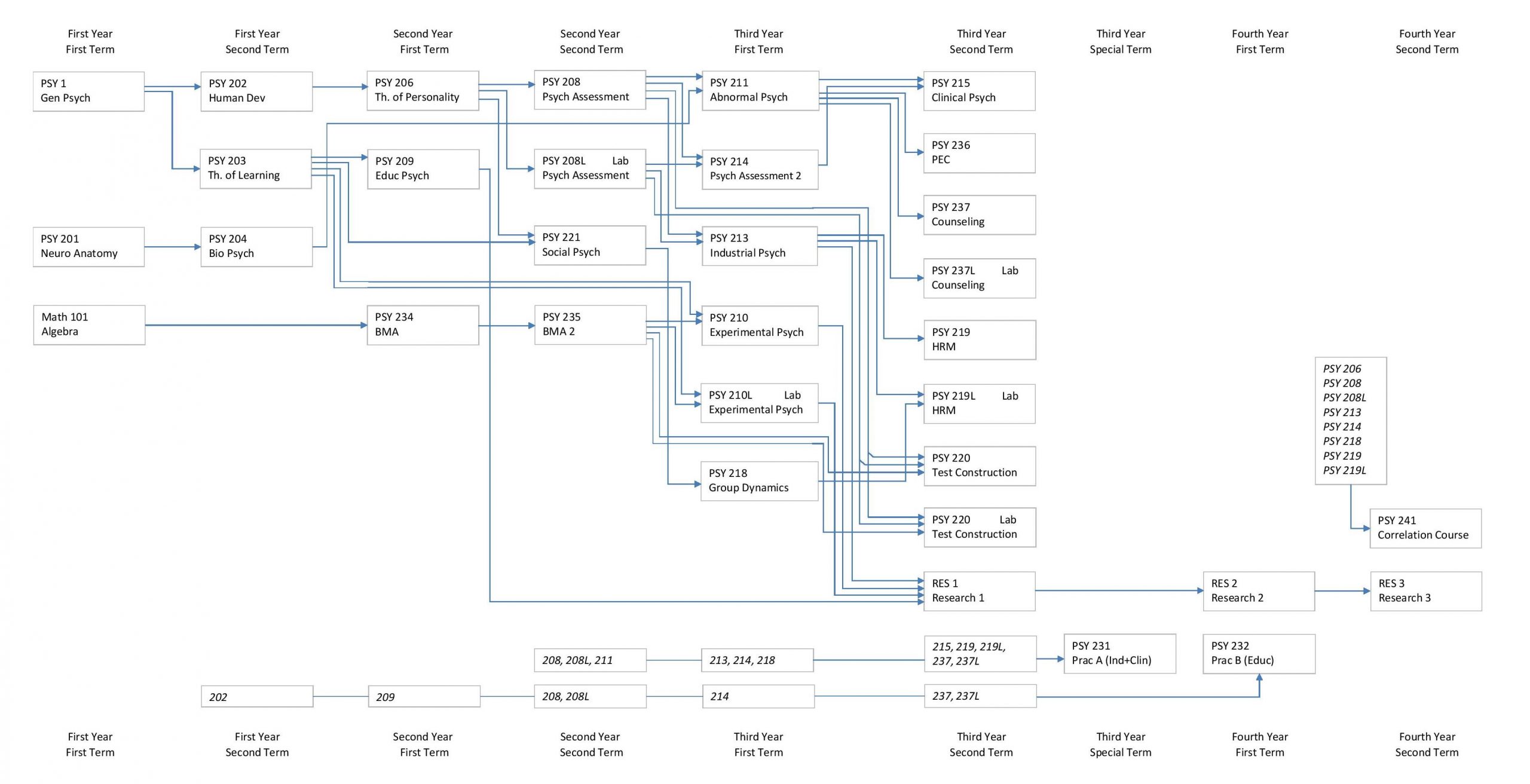
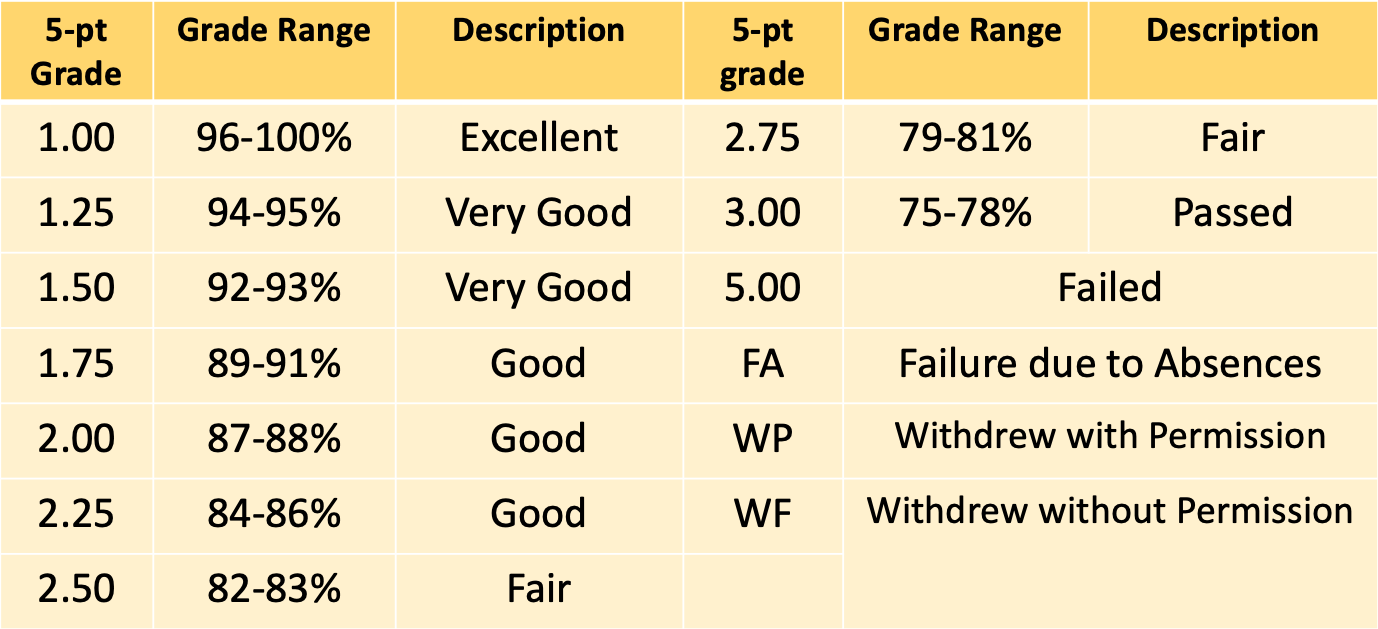
( + )/2
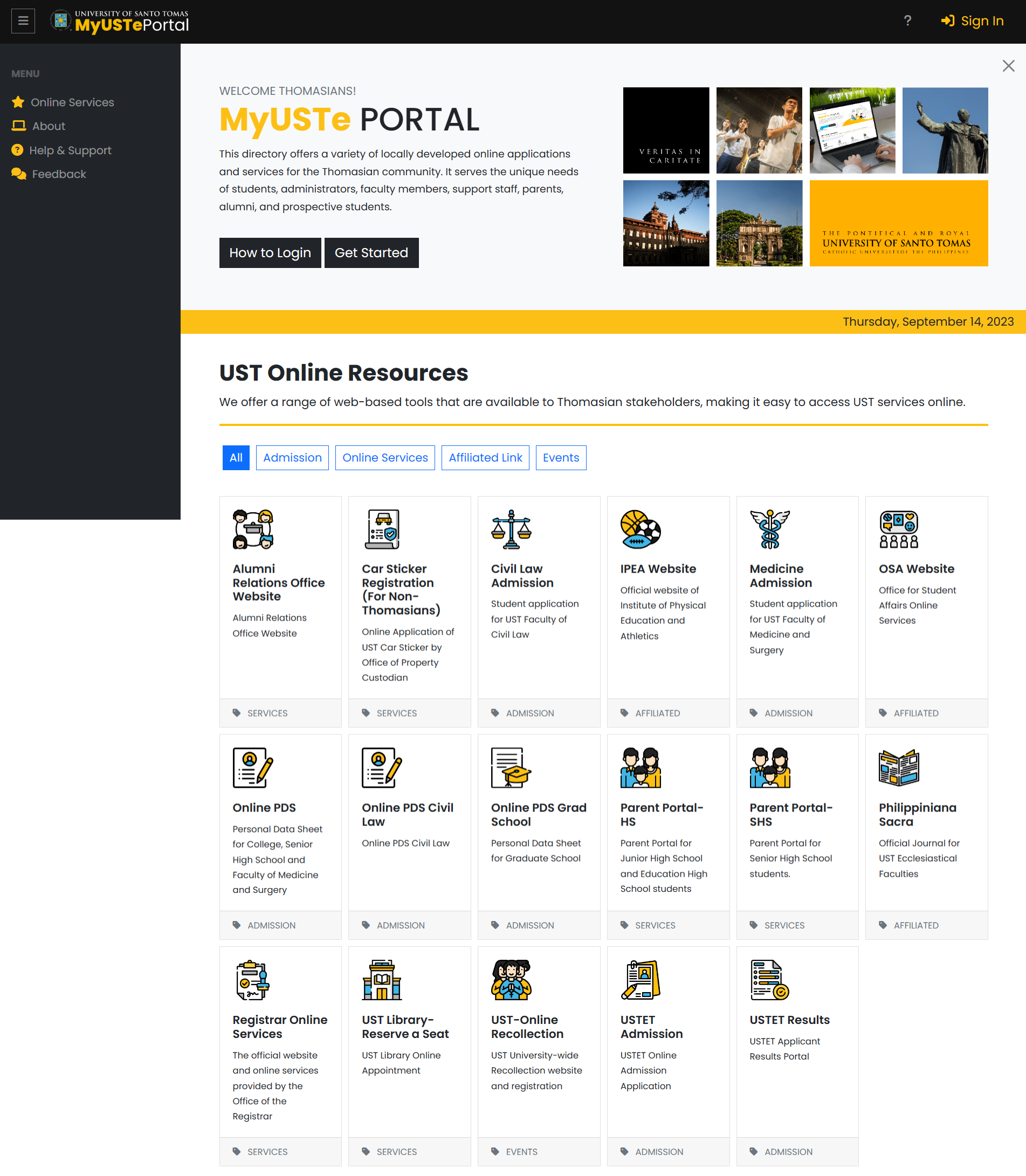
The average raw grade is transmuted to the 5-point grade equivalent. A sample matrix of computation based on 60-raw grade passing mark is shown:
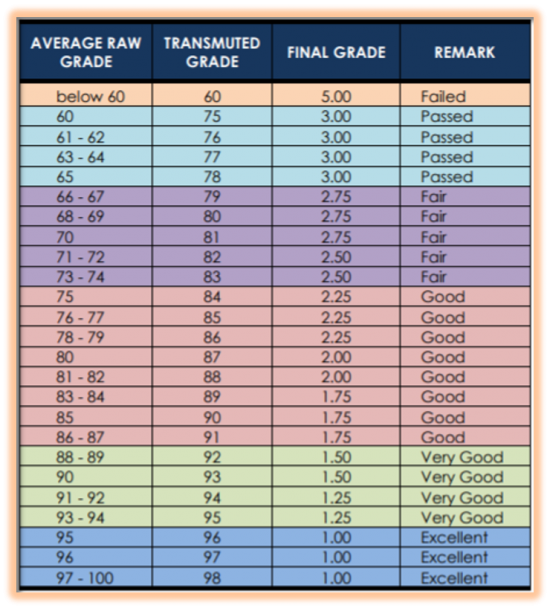
Lecture and their corresponding laboratory courses are known as Co-Requisites.
Lecture Courses
For most technical courses, the passing raw grade is 60.
| Class Standing | 60% |
| Preliminary / Final Exams | 30% |
| Course Inquiry Project (CIP) | 10% |
Course Inquiry Project
Laboratory Courses
| Class Standing | 70% |
| Preliminary / Final Exams | 30% |
Regular: No deficiencies and taking the regular load
Irregular: With back subjects and/or with uncleared deficiencies (5.0, WF, FA, INC)
The College of Science is the second home to her students. The college looks after not only the students’ academic progress but also their personal development and well-being.
The following are certain policies and guidelines on student welfare and development set by the College of Science and the Office for Student Affairs.
Based on PPS No. 1027: Code of Conduct
The University of Santo Tomas is the second home of the Thomasian students. Its task is mainly to form and improve the students’ character, attitude and moral values, as well as to develop their intellectual, physical and psychological fitness. A proper norm of conduct is designed to inculcate these ideals.
The University, through its Counseling and Career Center, aim to help learners achieve holistic student development and success.
Counseling and Case Management
Career Services
Imposition of disciplinary action is progressive. As such, the following list shows the levels of disciplinary action.
Offenses punishable by non-readmission, exclusion, or expulsion
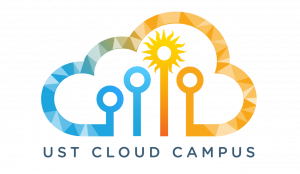
Learning in-campus during this COVID-19 pandemic seems almost inconceivable, but teaching and learning continue off-campus through a Learning Management System long-established in the university. UST’s learning management system, known as the UST Cloud Campus, is managed by the Educational Technology Center.
The Cloud Campus combines the eLearning environment with powerful eLearning tools.
eLearning Environment powered by BlackBoard
Powerful eLearning Tools powered by Office 365 and Google for Education
Each academic unit has an appointed e-Learning specialist, who can be reached via e-mail: edtech.sci@ust.edu.ph.
2017-October
UST Passing Rate: 139 passers (96.53%)
2nd Top Performing School
National Passing Rate: 56.97%
Topnotchers
#6 – Romelito Manuel D. Clorina, RPsy (83.40%)
#8 – Ma. Angelica M. Dicioco, RPsy (83.00%)
#10 – Benson Mar L. Mengullo, RPsy (82.60%)
#10 – Michael Raymond P. Quejas, RPsy (82.60%)
#10 – Reine Maeko R. Ruiz, RPsy (82.60%)
2016-August
UST Passing Rate: 172 passers (91.86%)
2nd Top Performing School
National Passing Rate: 50.46%
Topnotchers
#4 – Kathleen Kaye S. Medrano, RPsy – 84.80%
#7 – Rose Anne B. Silva, RPsy – 84.20%
#8 – Princess Debbie A. Cootauco, RPsy – 84.00%
#9 – Mark Lawrence Q. Gale, RPsy – 83.80%
#9 – Ma. Vea Antoinette O. Olarte, RPsy – 83.80%
#9 – Rency Mae L. Silvestre, RPsy – 83.80%
2015-July
UST Passing Rate: 166 passers (89.25%)
Sole Top Performing School
National Passing Rate: 46.15%
Topnotchers
#1 – Van Alistair H. Faeldon, RPsy – 84.20%
#3 – Christine Allen D. Cadacio, RPsy – 83.80%
#5 – Criselle C. Chua, RPsy – 83.20%
#5 – Christina Gracia D. Meron, RPsy – 83.20%
#5 – Lyka C. Paraboles, RPsy – 83.20%
#6 – Alexandria P. Daplas, RPsy – 83.00%
#7 – Lisette Angela R. Natial, RPsy – 82.80%
#8 – Jamie Therese T. Lim, RPsy – 82.60%
#9 – Hannah Grace C. Rivera, RPsy – 82.40%
#10 – Camille Sigrid L. Vasquez, RPsy – 82.20%
2014-October
UST Passing Rate: 163 passers (81.91%)
Sole Top Performing School
National Passing Rate: 39.29%
Topnotchers
#1 – Angeli Charmaine C. Tan, RPsy – 84.60%
#4 – Sean Michael P. Orbigo, RPsy – 84.00%
#4 – Erika Mae Q. Placido, RPsy – 84.00%
#5 – Arteliz S. Puti, RPsy – 83.80%
#6 – Juhnelynn C. Lanuza RPsy – 83.60%
#9 – Dianara B. Capito, RPsy – 83.00%
#9 – Mary Keziah T. Rafol, RPsy – 83.00%

CHEd Center of Excellence
Center of Excellence (COE) refers to a department within a higher education institution, which continuously demonstrates excellent performance in the areas of instruction, research and publication, extension and linkages and institutional qualifications.

ASEAN University Network – Quality Assurance Certified
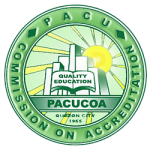
PACUCOA Level IV Accreditation (The Highest)
These are the programs that are highly respected in the Philippines and with prestige and authority comparable with excellence foreign universities. They are granted full autonomy for the program.

The University of Santo Tomas is one of the leading private research universities in the Philippines and is consistently ranked among the top 1000 universities in the whole world. With academic degrees and research thrusts in the natural, health, applied, social, and sacred sciences, as well as business and management, the University continuously strives to make a positive impact on the society.
Visit Us:
Espana Blvd., Sampaloc, Manila, Philippines 1008

© Copyright 2019. University of Santo Tomas. All Rights reserved. | Powered by Communications Bureau